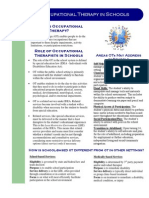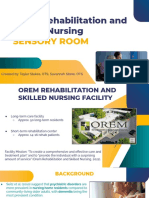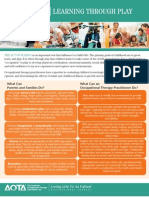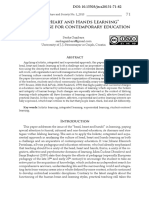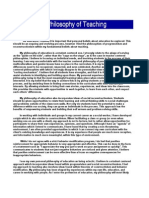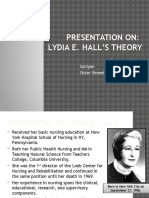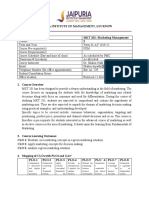Living With An Autism Spectrum Disorder (ASD) : Succeeding in College
Living With An Autism Spectrum Disorder (ASD) : Succeeding in College
Copyright:
Available Formats
Living With An Autism Spectrum Disorder (ASD) : Succeeding in College
Living With An Autism Spectrum Disorder (ASD) : Succeeding in College
Original Title
Copyright
Available Formats
Share this document
Did you find this document useful?
Is this content inappropriate?
Copyright:
Available Formats
Living With An Autism Spectrum Disorder (ASD) : Succeeding in College
Living With An Autism Spectrum Disorder (ASD) : Succeeding in College
Copyright:
Available Formats
TIPS
For Living Life To Its Fullest
LIVING WITH AN AUTISM SPECTRUM DISORDER (ASD): SUCCEEDING IN COLLEGE
OCCUPATIONAL THERAPY PRACTITIONERS can help young adults with an ASD acquire the skills needed to succeed in college life. These include being independent in self-care and daily tasks, participating in social events on campus, making friends, and tolerating the sensory features of a crowded and often confusing environment. The following tips are from occupational therapy practitioners working with students at the college level.
If you want to:
Consider these activity tips:
An occupational therapy practitioner offers expertise to:
Evaluate the students abilities and help identify schools that will play to these strengths. Provide information on the types of free supports offered to students who self-disclose a disability, and the supports offered for a fee, at particular schools. Collaborate with the college staff to identify potential challenges and solutions and develop strategies to support the student. Collaborate with residential advisors on the best living space for the student: some colleges offer drug-free and/or quiet dorms, or they offer single rooms. A small house may be a better fit than a large dormitory. Evaluate the students strengths, and match these strengths and interests to social opportunities on campus and in the community, identify adaptations or modifications to help the student succeed, and provide education or training to others to support the student in social activities. Consider how inclusive the opportunities are, the demands on group members, how often they meet, and how student participation can be encouraged. Review the social rules of these activities, and help the student practice how others are expected to behave. For example, during college sporting events one shouldnt yell at the referee or heckle the other team as is sometimes seen on TV. Help the student learn ways to be flexible when participating in activities with others. Review and practice self-advocacy and self-disclosure discussions which may assist others in understanding the students social difficulties.
Find a college that is a good fit for the student.
When visiting schools, focus on how each can help the student succeed: How much support does the college offer? How flexible are the philosophy, teaching methods, and curriculum? How large are the classes? How many classes can a student take and still maintain full-time status? How extensive are the support services? Will there be a residential advisor on the dorm floor? What types of contracts/waivers can be put in place to maintain student confidentiality yet still share enough information with the family to ensure health and safety?
Watch videos of campus events and point out specific behaviors. Attend events together before the student is enrolled to help clarify expectations. Help the student participate in social activities on campus. Ask the university staff how to find a peer support network, even if you have to pay for this service, so that the student has others to go to events with. This is particularly important in the beginning before the student finds friends with similar interests. Share ways to build up to additional new experiences based on the students particular skills, challenges, and references, without adult input.
If you want to:
Consider these activity tips:
Discuss the hidden rules of college life, relative to dorms (e.g., clean up after yourself, wait your turn in the bathroom, do not borrow personal items without asking, and compromise on TV or music choices) and academics (e.g., manage your time without help from professors, share information during study groups, dont monopolize class time with questions). Designate a specific place for each item in the room, especially school supplies and class materials. Use labels if necessary to ensure items are returned to the correct location. Review and practice how to go to the residential staff when assistance is needed. Suggest that the student avoid situations that may become overwhelming (e.g., loud concerts, games, and rallies) and that he or she sit in an alcove or another quiet area in the cafeteria during busy times. Help the student decide whether to be identified as having a disability and possibly have some disability awareness offered in the dorm (to help others understand why music and lights may need to be lowered).
An occupational therapy practitioner offers expertise to:
Analyze how the student performs activities, and address needed strategies and skills to complete daily tasks within the dorm and campus environments. Identify the type of assistance needed to help the student be independent, whether from others or via technology (e.g., smart phone reminders). Work with residential and other staff on accommodations for the student. Collaborate with the resource counselor or education team to create a daily checklist or schedule in a format most appropriate for the student. Address things like setting the alarm, attending class, and getting to the cafeteria during posted hours.
Help the student manage self-care activities like sharing a bathroom, eating in the cafeteria, staying on schedule, and maintaining personal belongings.
Help the student tolerate new sensory experiences, such as fire drills at night, loud and crowded spaces, the noise of roommates, and/or the smells of a common bathroom.
Work with college staff on a system to manage potentially stressful or anxiety producing situations. For example, the student may need a private room, a safe place on campus to go when overwhelmed, a buddy system, relaxation strategies, a mentor, etc. Identify appropriate calming or stimulating sensory experiences that the student can use throughout the day to support self-regulation. Work with college staff to modify the requirements of academic output. For example, if verbal responses are a challenge, are written responses acceptable? Is the student entitled to extra time for test taking?
Need More Information?
Students who were eligible to receive occupational therapy in the school environment through the Individuals with Disabilities Education Act (IDEA) can seek assistance from the local Board of Education to develop a transition plan as they prepare for college. Once enrolled, students can self-identify to the college office responsible for supporting students with disabilities to determine what services are offered free of charge and what additional services are offered for a fee. A plan of support can be created under Section 504 of the Rehabilitation Act, the Americans with Disabilities Act (ADA), or for an additional fee. Additionally, the local autism resource center can identify occupational therapy practitioners in the region who could offer services to the college to develop and implement support strategies. You can find additional information through the American Occupational Therapy Association at www.aota.org.
Occupational therapy is a skilled health, rehabilitation, and educational service that helps people across the lifespan participate in the things they want and need to do through the therapeutic use of everyday activities (occupations). Copyright 2012 by the American Occupational Therapy Association. This material may be copied and distributed for personal or educational uses without written consent. For all other uses, contact copyright@aota.org.
You might also like
- Kawa Model PDFDocument5 pagesKawa Model PDFOvidiu Muntean0% (1)
- A Case Study On Task Oriented ApproachDocument48 pagesA Case Study On Task Oriented ApproachTIMOTHY NYONGESA50% (2)
- 25 OT Frames of Reference in Brief - Ram, APDocument23 pages25 OT Frames of Reference in Brief - Ram, APS.JAIVIGNESH OTNo ratings yet
- Fall Prevention For Older AdultsDocument2 pagesFall Prevention For Older AdultsThe American Occupational Therapy AssociationNo ratings yet
- Fall Prevention For Older AdultsDocument2 pagesFall Prevention For Older AdultsThe American Occupational Therapy AssociationNo ratings yet
- Dementia AOTA Helpful Fact SheetDocument2 pagesDementia AOTA Helpful Fact SheetMysti Reeder100% (1)
- Occupational Therapy's Role in Skilled Nursing FacilitiesDocument4 pagesOccupational Therapy's Role in Skilled Nursing FacilitiesThe American Occupational Therapy Association100% (1)
- 630 Occupational Profile and Intervention PlanDocument22 pages630 Occupational Profile and Intervention Planapi-282538590100% (1)
- Grief and LossDocument2 pagesGrief and LossThe American Occupational Therapy AssociationNo ratings yet
- DepressionDocument2 pagesDepressionThe American Occupational Therapy Association0% (1)
- OT Practice June 4 IssueDocument27 pagesOT Practice June 4 IssueThe American Occupational Therapy AssociationNo ratings yet
- Occupational Therapy's Role in Health PromotionDocument4 pagesOccupational Therapy's Role in Health PromotionThe American Occupational Therapy Association100% (2)
- Occupational Therapy's Role in Skilled Nursing FacilitiesDocument4 pagesOccupational Therapy's Role in Skilled Nursing FacilitiesThe American Occupational Therapy Association100% (1)
- Living With An Autism Spectrum Disorder (ASD) : The High School YearsDocument2 pagesLiving With An Autism Spectrum Disorder (ASD) : The High School YearsThe American Occupational Therapy AssociationNo ratings yet
- Occupational Therapy Fact SheetDocument2 pagesOccupational Therapy Fact SheetMedford Public Schools and City of Medford, MANo ratings yet
- Occupational Therapy Survival GuideDocument12 pagesOccupational Therapy Survival Guideapi-256686248No ratings yet
- OT Profile As A GuideDocument8 pagesOT Profile As A GuideClara WangNo ratings yet
- Occupational Analysis and Activity Analysis: OT 603 Foundations of OT PracticeDocument11 pagesOccupational Analysis and Activity Analysis: OT 603 Foundations of OT PracticeNgọc BíchNo ratings yet
- OT and Eating DysfunctionDocument1 pageOT and Eating DysfunctionMCris EsSemNo ratings yet
- Occupational Profile & Intervention PlanDocument19 pagesOccupational Profile & Intervention Planapi-262531856100% (1)
- Smart Goals Template 05Document2 pagesSmart Goals Template 05Shruti Sharma100% (1)
- Occupational Therapy in Amputee Rehabilitation.: Sue HayesDocument23 pagesOccupational Therapy in Amputee Rehabilitation.: Sue HayesCatrinel ȘupialăNo ratings yet
- Case Study For BipolarDocument7 pagesCase Study For Bipolarapi-285705203No ratings yet
- Pediatric SpaDocument11 pagesPediatric Spaapi-420919156100% (2)
- OT Practice August 6 IssueDocument19 pagesOT Practice August 6 IssueThe American Occupational Therapy AssociationNo ratings yet
- MOHO Intervention Implementation - GUADALQUIVERDocument3 pagesMOHO Intervention Implementation - GUADALQUIVERKoyceNo ratings yet
- Model of Human Occupation (MOHO)Document6 pagesModel of Human Occupation (MOHO)Rebecca MarquesNo ratings yet
- Soap 11Document4 pagesSoap 11api-436429414No ratings yet
- Occupational TherapyDocument12 pagesOccupational TherapyshielaNo ratings yet
- Effectiveness of Paediatric Occupational Therapy For Chidren With Disabilities A Systematic ReviewDocument16 pagesEffectiveness of Paediatric Occupational Therapy For Chidren With Disabilities A Systematic ReviewCynthia RodriguesNo ratings yet
- Occupational Therapy and Mental Health 1Document18 pagesOccupational Therapy and Mental Health 1Roman -No ratings yet
- Occupational Therapy's Role in Restraint Reduction or EliminationDocument2 pagesOccupational Therapy's Role in Restraint Reduction or EliminationThe American Occupational Therapy AssociationNo ratings yet
- Occupational Analysis Intervention PlanDocument19 pagesOccupational Analysis Intervention Planapi-293223028No ratings yet
- Fieldwork Case Study Treatment Plan AssignmentDocument11 pagesFieldwork Case Study Treatment Plan Assignmentapi-398892840No ratings yet
- Occupational Therapy in Child Psychiatry (Emellia)Document19 pagesOccupational Therapy in Child Psychiatry (Emellia)Noor Emellia JamaludinNo ratings yet
- Part 2: Social Skills Training: RatingDocument3 pagesPart 2: Social Skills Training: RatingGina GucioNo ratings yet
- Running Head: Occupational Profile and Intervention Plan 1Document19 pagesRunning Head: Occupational Profile and Intervention Plan 1api-292735638No ratings yet
- 630 Submitted Occupational Profile and AnalysisDocument21 pages630 Submitted Occupational Profile and Analysisapi-310815315No ratings yet
- The Kawa ModelDocument12 pagesThe Kawa ModelSarah Diyana Nasrudin100% (1)
- Occupational Therapy's Role in Managing ArthritisDocument2 pagesOccupational Therapy's Role in Managing ArthritisThe American Occupational Therapy AssociationNo ratings yet
- Occupational Therapy AssessmentDocument3 pagesOccupational Therapy AssessmentEllySaleh100% (1)
- Community Integration Questionnaire Testing FormDocument4 pagesCommunity Integration Questionnaire Testing FormriddhiNo ratings yet
- Sensory Room Presentation Due 12Document9 pagesSensory Room Presentation Due 12api-582889983No ratings yet
- Occupational Analysis Intervention Plan PDFDocument20 pagesOccupational Analysis Intervention Plan PDFapi-293182319No ratings yet
- Ot201 Midterm NotesDocument16 pagesOt201 Midterm NotesLloyd EscanillaNo ratings yet
- Activity Analysis Sample PedrettiDocument4 pagesActivity Analysis Sample PedrettiLenard Yel Fernandez100% (1)
- Occupational Therapy's Role in Diabetes Self ManagementDocument2 pagesOccupational Therapy's Role in Diabetes Self ManagementThe American Occupational Therapy AssociationNo ratings yet
- OT Practice FrameworkDocument12 pagesOT Practice Frameworkenrico_aguila100% (2)
- 2001 Candidate Handbook: National Board For Certification in Occupational Therapy, Inc. (Nbcot)Document54 pages2001 Candidate Handbook: National Board For Certification in Occupational Therapy, Inc. (Nbcot)engshi18No ratings yet
- Occupational Therapy Discharge SummaryDocument5 pagesOccupational Therapy Discharge Summaryapi-436821531100% (2)
- Occupational Therapy's Role in Adult Cognitive DisordersDocument2 pagesOccupational Therapy's Role in Adult Cognitive DisordersThe American Occupational Therapy AssociationNo ratings yet
- OT Practice April 23 IssueDocument64 pagesOT Practice April 23 IssueThe American Occupational Therapy Association100% (1)
- Marcus Evaluation - StruthersDocument8 pagesMarcus Evaluation - Struthersapi-355500890100% (1)
- Learning Through PlayDocument2 pagesLearning Through PlayThe American Occupational Therapy Association100% (1)
- Occupational Therapy: Skills For LivingDocument14 pagesOccupational Therapy: Skills For Livingkalik67% (3)
- Promoting Strengths in Children and YouthDocument2 pagesPromoting Strengths in Children and YouthThe American Occupational Therapy AssociationNo ratings yet
- Occupational Therapy ProcessDocument3 pagesOccupational Therapy Processapi-339841373100% (1)
- OT in Pediatrics Quick Reference GuideDocument2 pagesOT in Pediatrics Quick Reference GuideMaya JohnsonNo ratings yet
- 4th Sem 651 Occupational ProfileDocument19 pages4th Sem 651 Occupational Profileapi-291545292100% (1)
- Occupational Therapy Toolbox Study GuideDocument44 pagesOccupational Therapy Toolbox Study GuideKristian ShumateNo ratings yet
- Student Treatment Session Soap 8Document9 pagesStudent Treatment Session Soap 8api-340625860100% (1)
- Occupational Profile and Intervention PlanDocument13 pagesOccupational Profile and Intervention Planapi-251993533No ratings yet
- Case Study Paper FinalDocument19 pagesCase Study Paper Finalapi-240832658100% (1)
- Activity & Occupational AnalysisDocument6 pagesActivity & Occupational AnalysisZachary TagardaNo ratings yet
- Occupational Therapy Practice FrameworkDocument31 pagesOccupational Therapy Practice FrameworkLian Michael0% (1)
- Movement Difficulties in Developmental Disorders: Practical Guidelines for Assessment and ManagementFrom EverandMovement Difficulties in Developmental Disorders: Practical Guidelines for Assessment and ManagementNo ratings yet
- OT Practice December 17 IssueDocument24 pagesOT Practice December 17 IssueThe American Occupational Therapy Association100% (1)
- OT Practice September 10 IssueDocument24 pagesOT Practice September 10 IssueThe American Occupational Therapy Association100% (1)
- OT Practice November 26 IssueDocument27 pagesOT Practice November 26 IssueThe American Occupational Therapy Association100% (1)
- OT Practice October 8 IssueDocument21 pagesOT Practice October 8 IssueThe American Occupational Therapy AssociationNo ratings yet
- OT Practice September 24 IssueDocument24 pagesOT Practice September 24 IssueThe American Occupational Therapy Association100% (2)
- Childhood ObesityDocument2 pagesChildhood ObesityThe American Occupational Therapy AssociationNo ratings yet
- Recess PromotionDocument2 pagesRecess PromotionThe American Occupational Therapy Association100% (1)
- OT Practice March 26 IssueDocument19 pagesOT Practice March 26 IssueThe American Occupational Therapy Association50% (2)
- How To Use AOTA's Mental Health Information SheetsDocument2 pagesHow To Use AOTA's Mental Health Information SheetsThe American Occupational Therapy AssociationNo ratings yet
- OT Practice July 2 IssueDocument22 pagesOT Practice July 2 IssueThe American Occupational Therapy Association100% (1)
- Promoting Strengths in Children and YouthDocument2 pagesPromoting Strengths in Children and YouthThe American Occupational Therapy AssociationNo ratings yet
- OT Practice July 23 IssueDocument28 pagesOT Practice July 23 IssueThe American Occupational Therapy Association100% (1)
- OT Practice August 6 IssueDocument19 pagesOT Practice August 6 IssueThe American Occupational Therapy AssociationNo ratings yet
- 2012 Conference Program GuideDocument116 pages2012 Conference Program GuideThe American Occupational Therapy AssociationNo ratings yet
- The Role of Occupational Therapy in Palliative CareDocument4 pagesThe Role of Occupational Therapy in Palliative CareThe American Occupational Therapy AssociationNo ratings yet
- Pictorial History of AOTADocument5 pagesPictorial History of AOTAThe American Occupational Therapy Association0% (4)
- OT Practice April 9 IssueDocument44 pagesOT Practice April 9 IssueThe American Occupational Therapy Association100% (1)
- Occupational Therapy's Role in Restraint Reduction or EliminationDocument2 pagesOccupational Therapy's Role in Restraint Reduction or EliminationThe American Occupational Therapy AssociationNo ratings yet
- OT Practice April 23 IssueDocument64 pagesOT Practice April 23 IssueThe American Occupational Therapy Association100% (1)
- Occupational Therapy in School SettingsDocument2 pagesOccupational Therapy in School SettingsThe American Occupational Therapy AssociationNo ratings yet
- Occupational Therapy's Role in Bariatric CareDocument2 pagesOccupational Therapy's Role in Bariatric CareThe American Occupational Therapy AssociationNo ratings yet
- Occupational Therapy For Young Children Birth Through 5 Years of AgeDocument2 pagesOccupational Therapy For Young Children Birth Through 5 Years of AgeThe American Occupational Therapy AssociationNo ratings yet
- Occupational Therapy's Role With Posttraumatic Stress DisorderDocument2 pagesOccupational Therapy's Role With Posttraumatic Stress DisorderThe American Occupational Therapy AssociationNo ratings yet
- Non Fiction Red Alert FormDocument2 pagesNon Fiction Red Alert Formapi-611572195No ratings yet
- "Head, Heart and Hands Learning" - A Challenge For Contemporary Education (2013)Document12 pages"Head, Heart and Hands Learning" - A Challenge For Contemporary Education (2013)PhamPhucNo ratings yet
- Digital Technology Adaption and Self-Esteem of Bsba Students Towards Online LearningDocument69 pagesDigital Technology Adaption and Self-Esteem of Bsba Students Towards Online LearningMonalisa TrayaNo ratings yet
- Employee Change PsychologyDocument12 pagesEmployee Change PsychologySoyed Mohammed Zaber HossainNo ratings yet
- Eval InfoDocument2 pagesEval InfoCindy YapNo ratings yet
- Bus 5211 Unit 3 DiscussionDocument5 pagesBus 5211 Unit 3 DiscussionmahmoodNo ratings yet
- A221-SGDG4032-CLO2 AssignmentDocument3 pagesA221-SGDG4032-CLO2 Assignmentمحمد رضوانNo ratings yet
- Aryan Gupta 11th HDocument9 pagesAryan Gupta 11th Hjabav90064No ratings yet
- JOB Satisfaction: Bharath Sanchar Nigam LimitedDocument40 pagesJOB Satisfaction: Bharath Sanchar Nigam LimitedSAJIN P GEORGENo ratings yet
- Learning Mathematics KimDocument6 pagesLearning Mathematics KimLim TorresNo ratings yet
- Understanding Cooperative Learning StructureDocument34 pagesUnderstanding Cooperative Learning StructureDueñas Mark Anthony G.No ratings yet
- Marcuse-Eros and CivilizationDocument152 pagesMarcuse-Eros and Civilizationscribd11567100% (2)
- As EducatorsDocument2 pagesAs EducatorsdesuangcoNo ratings yet
- Dissociative Identity Disorder: A Literature Review: Undergraduate Journal of PsychologyDocument6 pagesDissociative Identity Disorder: A Literature Review: Undergraduate Journal of PsychologyGerry AntoniNo ratings yet
- Psychopathology I 20Document16 pagesPsychopathology I 20manuelNo ratings yet
- Bibliography On Self-AwarenessDocument3 pagesBibliography On Self-AwarenessElvin Mirande Singson100% (1)
- Tsamadi Etal Stereotype Based Proming Without VORDocument10 pagesTsamadi Etal Stereotype Based Proming Without VORJoshua MendozaNo ratings yet
- Science 4 - Q4 - W1 DLLDocument4 pagesScience 4 - Q4 - W1 DLLFreya Joy Mercado - Santos100% (1)
- Lydia E Hall's Theory (Nov 06)Document42 pagesLydia E Hall's Theory (Nov 06)soniya naik100% (2)
- BPE9 - BPED2 (2nd Lesson - 2nd Term)Document12 pagesBPE9 - BPED2 (2nd Lesson - 2nd Term)Terry Jane JavelinaNo ratings yet
- 2021-Editorial - Defining The Clinical Boundary of Disruptive Mood Dysregulation Disorder Symptoms in YouthDocument3 pages2021-Editorial - Defining The Clinical Boundary of Disruptive Mood Dysregulation Disorder Symptoms in YouthCaio MayrinkNo ratings yet
- Principles of Management - Lecture Notes, Study Material and Important Questions, AnswersDocument24 pagesPrinciples of Management - Lecture Notes, Study Material and Important Questions, AnswersM.V. TV50% (2)
- Classical and Operant Conditioning - Ishika MittalDocument11 pagesClassical and Operant Conditioning - Ishika MittalIshika MittalNo ratings yet
- Topic 5: International Marketing ResearchDocument18 pagesTopic 5: International Marketing ResearchAmy Khe Shin YeuNo ratings yet
- Sheineh Mitelman Resume - WebsiteDocument1 pageSheineh Mitelman Resume - Websiteapi-316341415No ratings yet
- Summer Training Project Report On Patient Satisfaction Regarding Health CareDocument13 pagesSummer Training Project Report On Patient Satisfaction Regarding Health Care089 satyamNo ratings yet
- Unit 2 Helping RelationshipDocument66 pagesUnit 2 Helping RelationshipFaizah FatiqahNo ratings yet
- Socialstudies Lesson I - Goods and ServicesDocument3 pagesSocialstudies Lesson I - Goods and Servicesapi-241055006No ratings yet
- CO - Marketing Management - AY 2019-20Document10 pagesCO - Marketing Management - AY 2019-20AVANTIKA SAXENA Student, Jaipuria LucknowNo ratings yet
- Indian Bollywood EscortDocument9 pagesIndian Bollywood EscortIndianBollywood EscortNo ratings yet












